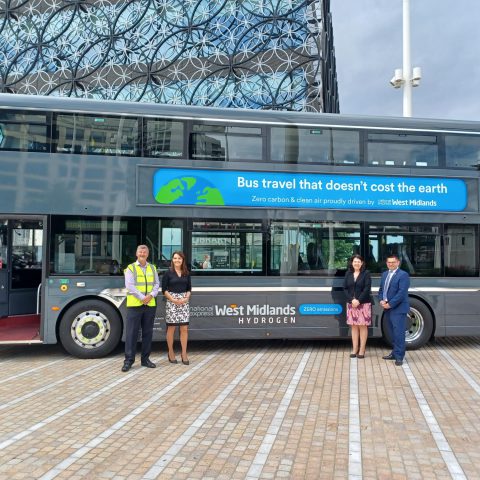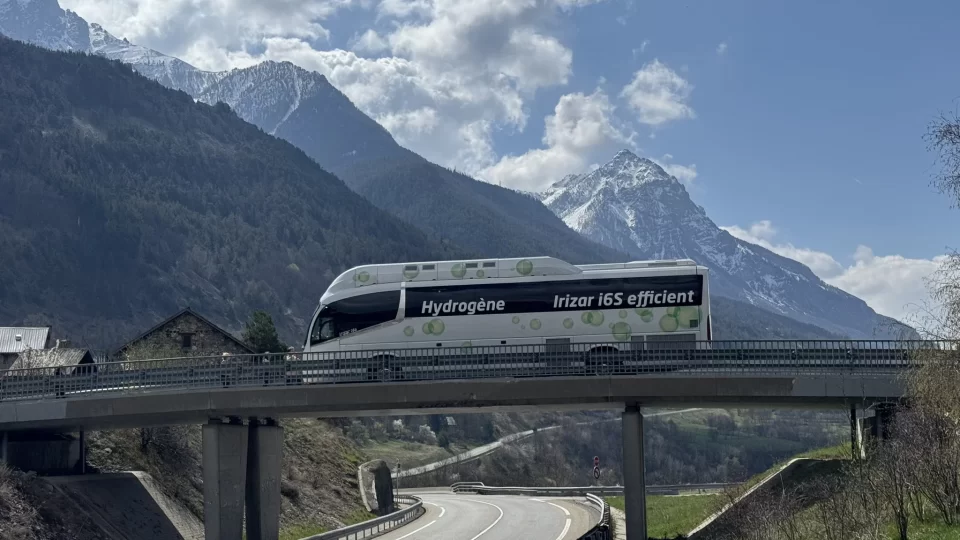First hydrogen bus landed in Birmingham (UK)
Birmingham City Council has unveiled the first of its 20 new fuel cell bus fleet, which is set to be in operation later this year. The order was signed in autumn 2020. The new buses have been purchased as part of the Council’s Clean Air Hydrogen Bus Pilot, which looks to ‘kick-start’ the hydrogen market […]

Birmingham City Council has unveiled the first of its 20 new fuel cell bus fleet, which is set to be in operation later this year. The order was signed in autumn 2020.
The new buses have been purchased as part of the Council’s Clean Air Hydrogen Bus Pilot, which looks to ‘kick-start’ the hydrogen market as a viable zero-emission fuel.
We can now work with our partners at National Express to start testing the buses, training drivers and adding livery design before rolling the buses out for the public in Autumn this year
Councillor Waseem Zaffar, Birmingham City Council’s Cabinet Member for Transport and Environment
The buses, which are made by Wrightbus and are the world’s first zero-emission hydrogen fuel-cell double deckers, will be operated in Birmingham by National Express. Today Wrightbus is the first fuel cell double-decker bus manufacturer, with a recent delivery performed in London for 20 vehicles. A fleet was put in operation in Aberdeen in early 2021. One year ago he said to have plans for the rollout of no less than 3,000 hydrogen buses in the UK by 2024, all built in Ballymena.
Potrebbe interessarti
Jo Bamford: «It’s not the bus. The issue is on infrastructure». Here H2 technology has cards to play. Our interview
The Clean Air Hydrogen Bus Pilot has been funded through OLEV (Office for Low Emission Vehicles), GBSLEP (Greater Birmingham & Solihull Local Enterprise Partnership), Birmingham City Council and JIVE project funding from the FCH JU (European Funding from the Fuel Cell Hydrogen Joint Undertaking) under grant agreement No 735582. The FCH JU receives support from the European Union’s Horizon 2020 research and innovation programme, Hydrogen Europe and Hydrogen Europe Research.
The council have also collaborated with ITM, who will be producing and dispensing the hydrogen fuel from the new re-fuelling hub at Tyseley Energy Park.
Wrightbus Streetdeck FCEV for Birmingham
The vehicle was unveiled in late 2018. Fuel cell system is made by Ballard, drivetrain is by Siemens. Name: Streetdeck FCEV. According to the specifications released at that time, the Wrightbus Streetdeck FCEV is 10.9 meter long and can carry up to 64 passengers (it shares the same chassis with the battery electric version). Battery pack, in the Streetdeck FCEV, is able to store 48 kWh: thanks to the fuel cell system (Ballard FCVelocity), they’re enough to cover, according to the manufacturer, 322 km (200 miles). A 426km extended range is also available.
Refueling the bus takes approximately seven minutes. Heating and cooling systems are zero emission as well. Automatic BMS continuously monitors and balances the stored power while the vehicle is in use. The bus has been developed as part of the JIVE project funded by EU (Joint Initiative for Hydrogen Vehicles across Europe).
Fuel cell buses in Birmingham in operation in autumn
Birmingham City Council’s Cabinet Member for Transport and Environment, Councillor Waseem Zaffar said: “Fuel cell buses offer a practical solution for cities to decarbonise public transport and immediately improve air quality. The delivery of the first bus is great news for our city and the rest of the region. It means that we can now work with our partners at National Express to start testing the buses, training drivers and adding livery design before rolling the buses out for the public in Autumn this year. This is a significant step towards our net zero carbon target and will provide Birmingham with a leading role in informing debate on supportive policies for zero emission public transport at a local and national level.








